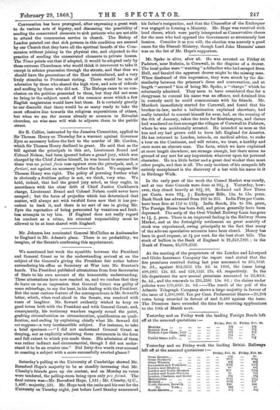We mentioned last week the squabble between the President and
General Grant as to the understanding arrived at on the subject of the General's giving the President fair notice before surrendering his office as Secretary at War into Mr. Stanton's hands. The President published attestations from four Secretaries of State to his own account of the honourable understanding. These attestations have now reached us, and we confess that they do leave on us an impression that General Grant was guilty of some subterfuge, to say the least, in his dealing with the President. But the most curious feature of the correspondence is Mr. Seward's letter, which, when read aloud in the Senate, was received with roars of laughter. Mr. Seward evidently wished to keep on good terms both with the President and with General Grant, and, consequently, his testimony wanders vaguely round the point, grafting circumlocution on circumlocution, qualification on quali- fication, and ending by explaining chiefly what Mr. Seward did not suppose—a very inexhaustible subject. For instance, to take a brief specimen :—" I did not understand General Grant as denying, nor as explicitly admitting these statements in the form and full extent to which you made them. His admission of them was rather indirect and circumstantial, though I did not under- stand it to be an evasive one." Did forty-five words ever succeed in coasting a subject with a more successfully averted glance ?






























 Previous page
Previous page